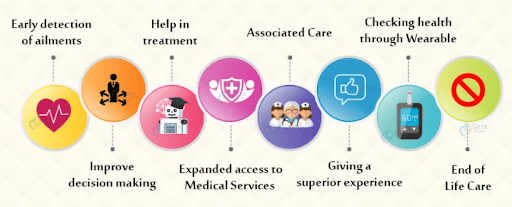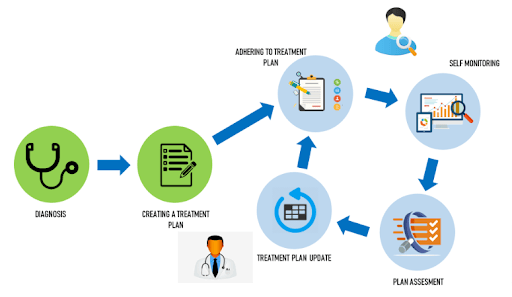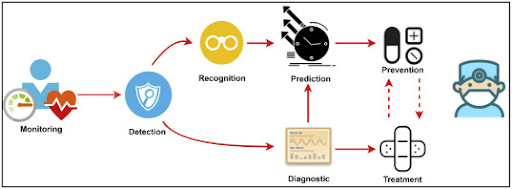![AI and IoT in Healthcare [Importance, Applications & Challenges]](https://atechsavvy.com/wp-content/uploads/2022/06/AI-and-IoT-in-Healthcare-1140x450.jpg)
When it comes to healthcare, data is becoming a new norm for it and Artificial Intelligence (AI) and the Internet of Things (IoT) are the leading elements in that.
Both technologies are helping healthcare professionals and entities to make more effective and result-driven clinical decisions so that patients can obtain suitable care solutions without encountering any complexity.
Hence, the healthcare industry is utilizing these robust technologies to improve healthcare outcomes while at the same time reducing human errors and overall operational costs.
So, let’s take a look at how a mixture of AI and IoT can help the entire healthcare industry.
AI and IoT in Healthcare: Recreating a new way to enhance
healthcare outcomes:

IoT devices are taking place in the healthcare environment to fetch and share the real-time medical data of the patients.
For instance, glucose monitors, blood pressure monitors, and connected inhalers. Such IoT devices enable healthcare professionals to analyze the patients’ real-time conditions even from remote areas.
However, IoT is only limited to data collection and sharing. In the true sense, it contains no mastership to put that data into the work.
To decode those concerns, AI is important for the healthcare industry to make efficient clinical decisions with the help of data.
AI utilizes its algorithms to track, monitor, train, and automate the data of the IoT devices to make it easy for healthcare professionals in their clinical workflows.
Thus, it is important for the healthcare industry to use AI-enabled IoT devices to maximize care actions along with making it more intellectual for clinical outcomes.
AI and IoT are playing a major role in the healthcare industry
A combination of two robust technologies always gives satisfactory outcomes. So, let’s discover some of the use cases of AI and IoT in healthcare.
1. Track, collect, and automate the patient data:

In healthcare, patient outcomes and quality care solutions are the things that every healthcare professionals and entities look forward to improving along with managing the costs.
To do so, patient real-time data collection and management is the most essential task for them and AI and IoT devices are there to help them with their performance-driven solutions.
For instance, a blood-pressure IoT device continuously monitors the heart rate of the patient and sends that data directly into the healthcare IT system.
Where an AI algorithm stores and monitors it to put that data into the clinical work so that medical experts can avoid the time-consuming workflows.
2. Chronic care management:

To deal with the chronic conditions of the patients along with maintaining the medical costs, AI and IoT integration have a huge potential as it has the ability to collect, monitor, and share real-time data of the patients’ chronic conditions.
AI makes it easier for healthcare experts to make critical decisions based on real-time patient data as it has a large number of structured and real-time data of the patients.
3. Drug and inventory management:

Inventory management is a time-consuming procedure for the healthcare entities which directly affects the patients’ outcomes while at the same time increasing overall management costs.
Hence, AI and IoT are used in the healthcare inventory and drug management to streamline the entire supply chain procedure by tracking, monitoring and automating the supply chain system.
So that healthcare professionals can get the right medical supply, for the right patient, at the right time and place.
4. For emergency care solutions:
It is the most significant use of AI and IoT in healthcare as IoT measures and shares the real-time medical condition of the patient data and AI monitors and compares its large-scale database.
It gives sufficient guidance to the emergency team to help the patients in their emergency medical conditions.
5. Virtual assistant for the healthcare professionals:

A virtual assistant is decoding the entire healthcare ecosystem’s workflow concerns as it reduces the unnecessary clinical visit of the patients.
AI-based IoT devices help healthcare professionals to provide comprehensive care solutions at any time of the day, from anywhere with the help of the real-time medical data of the patients.
As a result, it reduces the workflow of the healthcare entity which enables the healthcare experts to focus on the care solutions of the patients.
The benefits of the AI and IoT are making healthcare more effective
AI and IoT offer a wide range of solutions for healthcare professionals and entities to improve the quality care experience and efficiency of the healthcare ecosystem.
So, here are some of the benefits of AI and IoT in healthcare.
1.It improves the operational efficiency of healthcare professionals.
2. Reduces the operational and inventory costs
3. Streamlines drug and inventory management
4. Reduces the work burden of the healthcare professionals
5. Makes the healthcare ecosystem efficient, scalable, and flexible
6. Enhances patient outcomes and quality care experience
7. Enables healthcare professionals to make a suitable clinical decisions
8. It helps medical experts to provide personalized care solutions.
9. Real-time data and AI algorithms can help in the early-stage detection of the some the life-threatening illness
10.Reduces the human errors
11. AI has the potential to scale up the drug development procedure and clinical research
12. Helps virtual care providers to decode any health concerns of the patients with the real-time and large-scale medical data
Explore some of the IoT devices’ use cases in the healthcare
facilities:
IoT devices help healthcare facilities in remote patient monitoring and improve patient care experience with real-time patient data.
So, here are some examples of it.
1. Glucose monitor
2. Blood-pressure monitors
3. Depression and mood monitoring devices
4. Alzheimer’s and Parkinson’s disease monitors
5. Robotic surgery
6. Connected inhalers and contact lenses
Challenges for the AI and IoT devices in healthcare
Despite the numerous use cases of AI and IoT in healthcare, some challenges need to be addressed in the healthcare industry and here they are.
Data privacy and security:
Both technologies contain a large number of patients’ medical, financial, and personal data. As a result, cyber attackers always keep their eyes open for security loopholes.
In fact, managing data of the other healthcare IT systems such as EMR/EHR, HIS, and PACS is a challenging task as they contain unstructured data of the patients.
As a result, dealing with the data privacy and security loopholes is a headache for the healthcare industry.
Wrap up
The combination of AI and IoT holds a massive potential to improve patient outcomes along with reducing the operational and management costs for healthcare facilities.
However, both technologies require close attention to data security and accuracy so that the healthcare industry can elevate its efforts to new heights in this digital healthcare era.
For that, healthcare app development needs to be more effective, scalable, and flexible to help the healthcare facilities and patients in one go.
As a result, healthcare will become more accessible than ever along with affordable care solutions.


